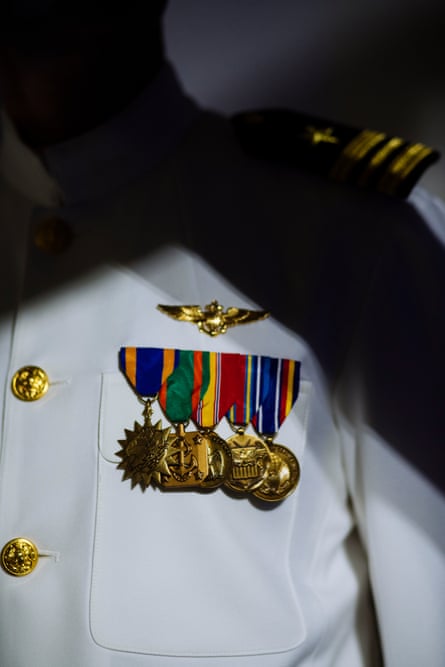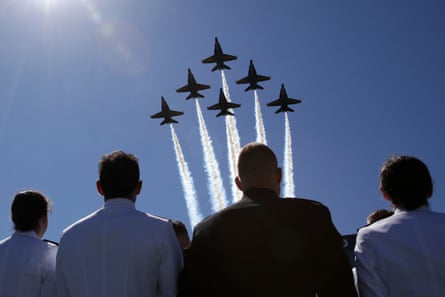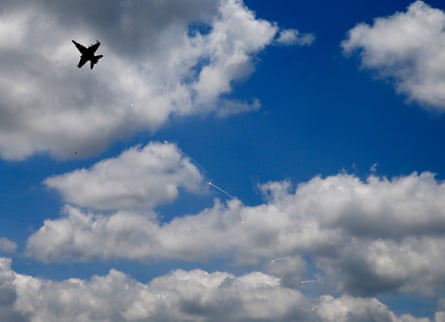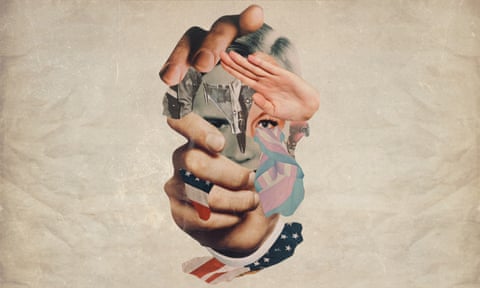Donald Trump’s ban on transgender people serving in the US military has spread a pall of fear over the 15,000 personnel it touches and emboldened hostility towards even those on the frontline of active duty, an investigation by the Guardian has found.
The ban kicked in on 12 April and, two months into its imposition, the full chilling effects are only now becoming apparent. Under its terms, trans people seeking to enlist in the military are subject to an almost total exclusion unless they keep their gender identity hidden.
Most individuals who are already serving are similarly forced to keep their true selves tightly closeted. There are exceptions, but they are narrowly defined and hard to procure.
Last week, Trump tried to justify the ban by complaining about the high costs associated with treating military personnel for gender dysphoria, the formal diagnosis when an individual’s gender is different from the one assigned to them at birth. In fact the entire medical budget for gender transition-related care is a tenth what the armed forces spend annually on Viagra and Cialis.
The US president has also blamed trans individuals for causing “tremendous disruption” within the armed forces. That conflicts with the experience of 19 countries including Australia, Canada, Germany and the UK that have allowed trans people to serve without incident.
In the US, all four military service chiefs have testified before Congress that there were no known negative effects during the three years in which President Obama opened the doors to trans people.
“The biggest impact of the ban is that we are denying ourselves future heroes. Our nation needs the best and finest to fight and win future wars and we are turning away people just because they are trans,” said Lt Col B Fram, communications director of SPART*A, an education and advocacy group representing trans service members.
The Guardian partnered with SPART*A to investigate how Trump’s ban is bearing down on trans women and men in active duty settings. Here we profile four people in the navy and air force.
All are in aircrew and at the sharp end of the US fighting machine. They are familiar with the intense sacrifices to family and self that a military career involves, and have put their lives on the line in conflict zones.
Yet they are now having to cope with severe pressures brought about by the ban. That includes mounting hostility from transphobic peers who see Trump’s move as license to taunt and ridicule, as well as the daily fear that if they are outed as trans they could lose everything.
The stakes are now so high that all four spoke to the Guardian insisting on absolute anonymity. As one of them put it: “If I were found out by even one person, that would be the end of my flying career.”
Emily Finnerty, US navy, F-18 fighter pilot, trans woman
When you meet Emily Finnerty in person, as the Guardian did recently, she comes across as more Tom Cruise than Tom Cruise. She has the same piercing gaze and verbal intensity of the Top Gun star, especially when describing the sensation of piloting an F-18 Super Hornet, the fighter jet that Cruise will fly in the sequel to the classic movie scheduled for release next year.

If Cruise’s role in Top Gun is Hollywood’s attempt to personify American military might and patriotic service, then Finnerty is the real deal. She knows what it’s like to fly at Mach speeds in that state-of-the-art $90m fighting machine. She has felt the punch in the gut when the aircraft explodes from the deck of a US navy carrier and endured the bone-crushing sustained 7.5gs of the dogfights that followed.
She is familiar with the terror and exhilaration of going zero to 160mph in two seconds. She can recall the glory of flying low through the canyons of Utah or the beauty of hugging the mountains of California. And she’s been there when training gets serious, notching up 60 combat missions in the all-too-real war zones of Iraq and Afghanistan.
Through all that, there has been the sacrifice that being on the frontlines of the US military extracts from her family and from herself. “My children didn’t know me, I was away so much. My back’s destroyed from the G-force. I’ve had near-death experiences from aircraft failure and I’ve seen friends die. But I’ve never betrayed the trust of my country and I’ve always answered the call.”
The US military has spent more than $11m in turning Finnerty from a young navy recruit over a decade ago into a lieutenant commander today. But now it is in danger of squandering every cent of that investment, by effectively valuing her as worthless.
Since the age of 10, Finnerty has secretly struggled with dysphoria. Though assigned male at birth, and presenting in public and within the navy as male, she has strong urges to transition and live authentically as a woman.
She came out to her wife and parents only a few weeks ago and is working through the trauma of that shattering revelation with her supportive family. If it is hard at home, it is far more difficult at work. Under the terms of Trump’s ban she will only be able to stay in the navy if she continues to wrap herself in a lie. She must put aside any desire to live as her authentic self and forego any medical treatment in order to present as a man and be allowed to continue to serve.
She is puzzled by the vast contrast between the faith that the military has put in her over so many years, and the utter lack of faith it is showing her now. “They have invested millions in me, and I have performed my duties to an exceptional level,” she said. “Yet because I see myself as a woman, I’m somehow less worthy to serve.”
The ironies of Finnerty’s position are not lost on her. Her mission within the military, she believes, is to serve the US constitution and uphold the freedom and human rights of her fellow Americans and people around the world. Yet to do so, she must forego her own freedom and human rights.
“My fellow service members and I have tried to build a better, safer world for people, but it’s a world I can’t live in,” she said.
She is being told that it is not in the best interests of the US military to have trans individuals openly serving. Yet for years she has been at the forefront of the most powerful fighting force on Earth, a closeted trans individual, earning plaudits and promotions all the way. To prove it she shows us her white dress jacket dripping with medals.
She could earn much more money and have an easier life for her family as a civilian – there are no prohibitions against flying as a commercial airline pilot. Yet she knows that were she to ask her superiors to reciprocate such personal sacrifice with even the most basic help, such as a session with a counselor about her dysphoria, that could put her wings and her entire Top Gun career in jeopardy.
“What do you think that does for the health of the individual?” she said. “Honestly, it’s a mess. I can’t be authentic and I’m not allowed to do anything about it.”
Finnerty is too much of an officer and a gentlewoman to criticize Trump for the trans ban. All she will say is: “I believe he thinks he’s doing what’s right. He’s the commander-in-chief.”
But she does confess to being disappointed and distressed by the order. “I’m angry, mostly because I think as a country we can do better. We are the frickin’ United States of America, we were founded on freedom. But here we are saying, ‘You can have your freedom, unless …’ That doesn’t jibe with me.”
What Trump and his joint chiefs of staff need to hear loud and clear is that Finnerty is now questioning her future in the services. At a time of a stunning shortage in fighter pilots, she is contemplating making an exit.
“It has made me think about getting out,” she said. “Maybe it’s time to go and be authentic.”

M, US navy, winged aviator, trans man
M, an active duty lieutenant and winged aviator in the navy, is most at risk of being evicted from the military of any of the four service members who spoke to the Guardian.
The cause of his precarious position is that he has begun to transition to male – without informing his superiors. As he puts it: “I am walking the fine line of fighting for myself but still fighting for my country, which, for trans individuals, is an absurdly immense challenge.”
He has had chest-contouring surgery as the first major step towards medically transitioning as a trans man. Now he knows that unless he succeeds in keeping his true existence utterly secret, his young, successful career in the navy could be snuffed out.
As the ban states, “transgender persons who require or have undergone gender transition are disqualified”. In short: get discovered, and you’re out.
The Guardian’s interaction with him was conducted in tightest security. He asked only to be referred to as “M” – the abbreviation of his male name that is in itself known only to very few. He also declined to discuss certain aspects of his story, such as the shocking harassment he endured from a former skipper, on grounds that some of his aircrew might recognize the detail and draw conclusions.
Over six years of military service, M has learned how to keep his head down and out of the spotlight. Despite two full tours of service fighting Isis in Iraq and Syria, many military awards and a spotless record, he has been forced to embrace secrecy.
“The ban has made me very careful around my squadron and fellow aircrew, including my wardroom. I’m exceedingly careful not to engage in discussion about the ban, or politics in general, and I keep my relationships with my peers strictly professional. I’ve established myself as being ‘very quiet’, and my silence is now considered normal.”
Despite his male identity, others continue to know him as the “female officer with the short haircut”. He grits his teeth when at formal functions he’s forced to wear women’s dress uniform with its antiquated 17th-century pants with side buttons, distinct suit top and hat that bears no resemblance to the men’s classic wide-brimmed sailor’s hat.
“It makes me feel like a fraud. I feel less and less like I’m participating in the great traditions of the navy, and more like I’m performing in costume. I’m not the same man who just a month ago was in a flight suit like everyone else flying combat missions.”
There’s another aspect of the double life M now lives under the ban. To those around him he is a demure, softly spoken, understated woman. Internally, he is a profoundly hurt and saddened man.
In emails to the Guardian, he laments that were he to openly begin testosterone hormone replacement therapy he would be downed from aviation permanently. He describes as “absurd” and “stone-aged” the fact that US armed forces still classify gender dysphoria as a “mental disorder”.
He is convinced that the most advantageous policy for the military would be the exact opposite of Trump’s ban. Allowing M to transition would actually benefit the navy because he could fulfill his potential in service to the nation. “I think my service would be even better if I didn’t have the anxiety of keeping closeted hanging over me,” he said.
At the root of it all, he thinks, is the ignorance and fear of the American public towards trans people. “So often, transgender individuals are made out to be these ‘scary’ concepts in faraway cities that you hear about on the news but have never met in real life. People – both civilian and military – need to realize that we are people too and make huge sacrifices that they would never dream of.”

Jennifer, US air force, flight engineer, trans woman
The mood has darkened in Jennifer’s command since the ban came in. A master sergeant and flight engineer in the air force, she has noticed that leadership in the higher ranks have started to pursue witch-hunts seeking to detect and remove trans individuals from the service.
At lower levels, the climate has grown even uglier. “Those who were against us have become far more outspoken about how we don’t belong,” she said. “It’s as though in this extremely transphobic environment they feel they have to bash trans military members merely to fit in.”
US air force flying operations have always been among the most hostile corners of the military for trans people. Even during the brief three-year period under Obama when restrictions were generally loosened, being outed in the air force would still cost aircrew their wings.
That prohibition is toughened under the new ban, with the added burden that verbal abuse surrounding it has intensified. When someone has the temerity to come out as trans in the air force, Jennifer said, news spreads quickly, they are promptly removed from flying status and they are branded in mess-room banter as “non-mission hackers” and “losers”.
“It doesn’t matter if they have an exemplary past record or that they are devoted to flying and deploying. None of that positive information gets out. All that is discussed is that they are trans and they don’t belong.”
Jennifer knows that the same brutal logic applies to her. As a trans woman who is required to be scrupulously male on base, it doesn’t matter that she has had an exemplary career in the air force spanning more than 20 years. It doesn’t matter that she’s flown more than 6,000 hours being qualified on several different aircraft and has been honored with more than 20 ribbons and medals.
“If I were found out by even one person, that would be the end of my flying career,” she said.
So, like M, she is very strict about security and keeping her womanhood secret. Since the ban kicked in, she said, “I have become far more guarded and watch everything I do, from my mannerisms to managing when I exercise and shower, where I go off-base after work and how I dress. I cannot ever let my guard down.”
She avoids alcohol for fear that it might lull her into disclosing personal information. She wears baggy clothes to hide her physique. She preplans every move she makes and thinks constantly that the sacred trust of those around her, the trust upon which the US military is founded, would instantly be eviscerated if anybody discovered her true self.
And yet her devotion to the air force remains constant. At times, though, she admitted, “my drive does take a hit when I am willing to die for freedoms others enjoy but I am being denied”.
She added: “I love my country and it’s people, even the ones who think I should be banned. I believe if they just had a chance to meet one of us and realize we are normal people trying to live our life, doing our best every day, they might change their mind.”

Caleb, US navy, aircrewman, trans man
Caleb is a petty officer who serves as a naval aircrewman, operating equipment in tactical missions around the world. He is the only one of the four service members profiled here to take advantage of a little known caveat within Trump’s trans ban known as the “grandfather clause”.
It allows people who were already in the armed forces and who acquired a diagnosis of gender dysphoria before the ban kicked in on 12 April to carry on serving in their correct gender. In other words, if you could get a military doctor officially to record your trans status in time, you could avoid the prohibition.
The clause sparked a frantic scramble by Caleb and many like him to secure a diagnosis by the deadline. Assigned female at birth, he is desperate to transition and is keen to start hormone replacement therapy and surgery.
But he is also desperate to hang on to his flight status and with it the valued role he so dearly loves that has taken him on numerous combat missions to Syria and other conflict zones. As he put it to the Guardian from his current deployment overseas: “It may be cheesy but every day when I walk on the flightline my pride surges. Often I look out the window over places I never dreamed I’d see.”
Applying for a diagnosis against the clock was hair-raising in itself. There was a long waiting list to see the one doctor at the behavioral health unit in his command who treats trans patients.
As the deadline approached, he took the hazardous step of visiting the general medical clinic to lobby staff for a rapid diagnosis. That was risky as it involved coming out as a trans man to people he did not know and could not necessarily trust.
Clinic workers were suspicious that he was seeking diagnosis as a ruse to shirk deployment. That really irked him, as the truth was precisely the reverse: he was delaying transition and potentially harming his own health so that he could carry on flying tactical missions.
By the time he finally got to see the doctor and have a diagnosis written into his record, it was with only days to spare. He squeaked through, along with up to 2,000 other trans service members who SPART*A estimates have been grandfathered in.
You might think that qualifying for the clause, and with it an exemption from the ban, would be the end of Caleb’s troubles. Not so. Though he has formally been recognized as a trans person, he feels far too unsettled by what has happened to go ahead with transition.
“On paper I’m safe from the ban, but I’m nervous that if I come out now I might lose my chance to fly. It would only take one person in my chain of command who doesn’t agree with transgender people being in the military for me to potentially be taken off deployments.”
To add to the jitters, the Pentagon made clear in the memo setting out the ban that the grandfather clause is legally tentative. The memo explicitly threatens that were the clause ever used to challenge the ban in court, then it would automatically be scrapped and everyone who had enjoyed its protection would immediately be expelled.
That leaves Caleb in uncharted territory. “I am proceeding with caution and being careful about coming out,” he said.
He remains closeted to all but a very few. He secretly binds his chest as one small concession to his authentic male identity, but wears his hair longer than he would choose to avoid attracting attention.
While he is delaying taking hormones to start medical transition because he fears it might lead to him being taken off flight status, he is grateful that being grandfathered in at least gives him the choice eventually to be openly trans while still remaining in the military. He says that makes him feel lucky.
He was also pleasantly surprised that when he privately came out to two co-workers recently they were generous and supportive. That has given him hope that one day he might be liberated without utterly being ostracized by those around him.
For now, though, he remains trapped in limbo. “I’m having to choose between serving my country in the job I love and being myself, and it’s really tough.”
